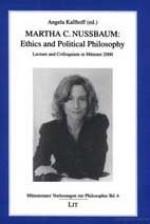|
This section contains 1,241 words (approx. 5 pages at 300 words per page) |

|
SOURCE: Marshall, Donald G. Review of Love's Knowledge, by Martha Nussbaum. Comparative Literature 46, no. 2 (spring 1994): 195-97.
In the following review of Love's Knowledge, Marshall questions the theoretical and philosophical foundations of Nussbaum's arguments.
Moral philosophy has flourished in recent years, and Martha Nussbaum has been one of its most vivid practitioners. Like several other philosophers, she argues [in Love's Knowledge: Essays on Philosophy and Literature] that the attentive reading of literary works, specifically novels, is an indispensable aid for moral reflection. Ways of thinking and writing that developed in the analytic tradition are appropriate to some inquiries, such as epistemology and philosophy of science, but they cannot accomplish what is necessary for moral philosophy.
This defect demarcates the positive philosophical content of moral philosophy. Following Aristotle, Nussbaum concedes important roles to general rules. They can aid moral development by serving as a summary of others' wise judgments. When...
|
This section contains 1,241 words (approx. 5 pages at 300 words per page) |

|


